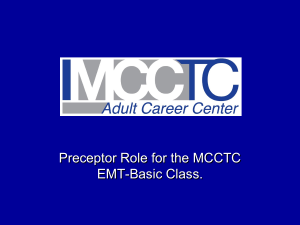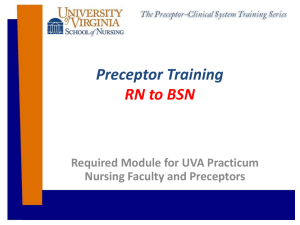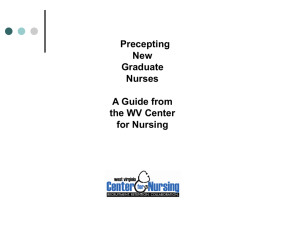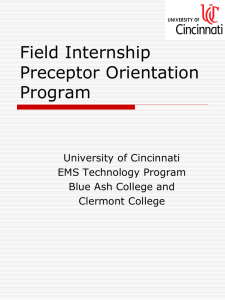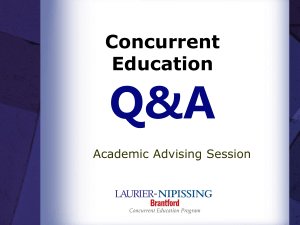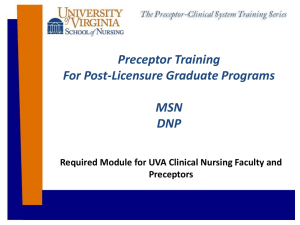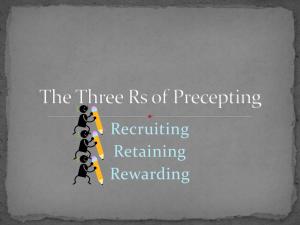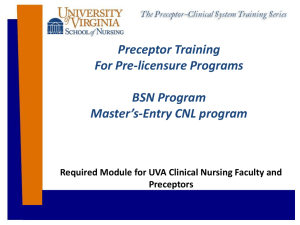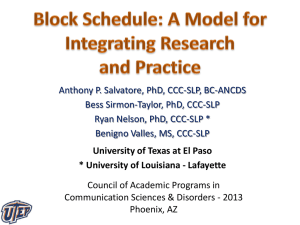on site - Milken Institute School of Public Health
advertisement
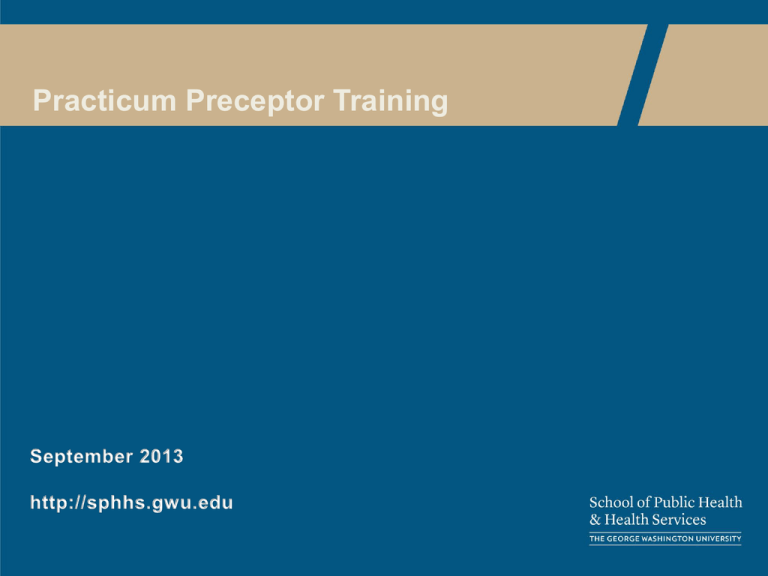
Practicum Preceptor Training Practicum Preceptor Training What is a Practicum? The Council on Education for Public Health (CEPH) states: “A planned, supervised, and evaluated practice experience is an essential component of a public health professional degree program.” Practicum Preceptor Training Student Objectives Over the course of the Practicum, students should: Develop practical skills Gain professional experience in health service and public health settings Build their professional networks Connect classroom and “real-world” learning Practicum Preceptor Training Together, we will … • Build the public health workforce • Prepare students to be more effective when they enter the workforce • Address more public health problems • Contribute to the public health of the DC region and beyond Practicum Preceptor Training Who are the Key People? Always: • You! • The Student • The departmental Practicum Director (PD) • The student’s Academic Advisor Also, in SPHHS: • Practicum Coordinator (PC) • Webmaster • Office of Student Services and Career Development • Office of Student Records • Associate Deans Practicum Preceptor Training SPHHS Practicum Sites • Have a public health mission (or department/section with such a mission) • Address significant public health problems • Offer students the opportunity to engage with experienced Site Preceptors • May be local, state, federal, or international agencies or organizations Practicum Preceptor Training SPHHS Site Preceptors • Are employees of the Site organization • Typically have at least 5 years of public health professional experience • May have a terminal degree in public health or a closely related field • When they do not, more years of experience are expected Practicum Preceptor Training Practicum is required for: • • • • • • Epidemiology and Biostatistics Environmental and Occupational Health Exercise Science Global Health Health Policy Prevention and Community Health • Community-Oriented Primary Care • Health Promotion • Maternal and Child Health • Public Health Communication and Marketing Practicum Preceptor Training School-wide Practicum Standards • Must be conducted in a public health setting • Under the supervision of an experienced public health professional • 120 hours • All hours must be completed on site • Conducted for credit/no credit Practicum Preceptor Training Program-specific Requirements • Vary, but all placements must meet SPHHS minimum standards • Planned • Supervised • Evaluated • Are tailored to program-specific competencies • Posted on the Practicum Website Practicum Preceptor Training Project Activities may include • Data analysis • Exposure assessment • Grant application preparation • Health education • Health promotion • Needs assessment • Policy analysis • Program planning • Program implementation • Program evaluation • Risk assessment • Study design • Design of study instruments • Surveillance Practicum Preceptor Training Preceptor Responsibilities: Prior to Student Placement 1. Submit Practicum Preceptor/Site Application, if not done previously 2. Work with Student (if you have one) to create a brief Project Description 3. Submit Preceptor Project Description Practicum Preceptor Training Preceptor Responsibilities: After the Placement 4. With the student, review and approve the final Practicum Plan the first day of the placement 5. Supervise the student’s work, and verify the student’s weekly contact hours 6. Evaluate and discuss the student’s professional behavior & performance 7. Provide SPHHS with feedback on the program and Practicum Website Practicum Preceptor Training Orientation When the student first arrives on site, the preceptor should brief him/her on the following: • • • • Policies Procedures Professional expectations, including dress code Resources (desk, supplies, parking, etc.) Practicum Preceptor Training Can the student use a Job/Internship as a Practicum? Yes, but: 1. The site and preceptor must meet program qualifications 2. The site preceptor cannot be the student’s current supervisor • 3. Contact hours must be completed under the supervision of the student’s approved practicum site preceptor The content and activities of the practicum must be distinct from the student’s regular work Practicum Preceptor Training Compensation The practicum may be paid or unpaid Can take many forms: • Conference fees • Local travel • Parking • Special equipment • Stipend • Tuition relief http://sphhs.gwumc.edu/academic s/practicum/ All forms must be completed online Site Preceptors will have access to only their student’s information Practicum Preceptor Training Tools available on the Website • Preceptor/Site Application • Mid-Point Evaluation – review/approval only • After 60 hours completed on site • Final Evaluation of Student • After 120 hours completed Practicum Preceptor Training Site Preceptor Application (1 of 3) • All applications must be verified by a PD and a PC Practicum Preceptor Training Site Preceptor Application (2 of 3) Practicum Preceptor Training Site Preceptor Application (3 of 3) Practicum Preceptor Training Site Information (1 of 3) Practicum Preceptor Training Site Information (2 of 3) Practicum Preceptor Training Site Information (3 of 3) Practicum Preceptor Training Project Description (1 of 3) Once a Preceptor and Site are approved, an email alert will be sent containing a password to login and submit projects. This will be available for viewing to all students Practicum Preceptor Training Project Description (2 of 3) Practicum Preceptor Training Project Description (3 of 3) Practicum Preceptor Training Final Preceptor Evaluation (1 of 2) Practicum Preceptor Training Final Preceptor Evaluation (2 of 2) Practicum Preceptor Training Troubleshooting… • Your first point of contact = – Track-specific Practicum Director (next slide) • Contact him/her about issues related to the: – Practicum experience and program – Student performance – Expectations • Practicum Program questions – Contact Dr. Pierre Vigilance (pndv@gwu.edu) • Practicum Website concerns – Contact the webmaster (sphhsweb@gwu.edu) Practicum Preceptor Training Practicum Directors Dr. Peter LaPuma eohptl@gwumc.edu Env. & Occ. Health Epi-Biostats Dr. Amanda Castel acastel@gwu.edu Ann Goldman sphasg@gwumc.edu Exercise Sc. Alex Dickman alexbld@gwu.edu Dr. Ashleigh Black ashblack@gwu.edu Halley Petersen-Jobsis hjobsis@gwu.edu Global Health Lara Cartwright-Smith laracs@gwu.edu Dr. Debora Goldberg dgoetz@gwu.edu Health Policy HSML PCH Dr. Robert Burke bobburke@gwu.edu Dr. Tamara Henry thenry@gwu.edu Karyn Pomerantz kpomeran@gwu.edu Questions? Contact Us Pierre Vigilance, MD, MPH Associate Dean for Practice & Associate Professor of Global Health Email - pndv@gwu.edu Twitter - @PierreVigilance & @GWPraxis Assistant – Caroline Hill – cchill@gwu.edu Webmaster – sphhsweb@gwu.edu Practicum Website: http://sphhs.gwumc.edu/academics/practicum/ School of Public Health and Health Services 2175 K Street NW Suite 500 Washington, DC 20037
